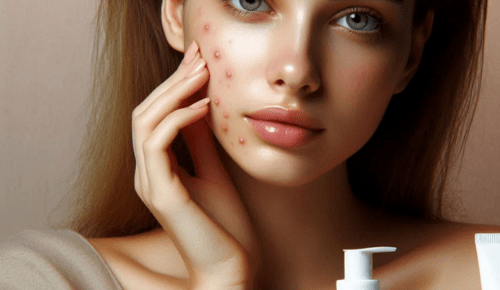
Acne scars can be a frustrating skin concern, but the right skincare routine can help improve their appearance over time. Whether you have dark spots, indentations, or redness left behind from acne, a consistent approach to skincare can encourage healing, promote cell turnover, and reduce the visibility of scars. Here’s a guide to treating acne scars effectively and achieving clearer, healthier skin.
Understanding Acne Scars
Acne scars occur when inflammation from breakouts damages the skin’s collagen structure. There are different types of scars, including:
- Atrophic Scars: Indented scars that result from collagen loss (e.g., ice pick, boxcar, and rolling scars).
- Hyperpigmentation: Dark spots or red marks left after a breakout that fade over time but may take months without treatment.
- Hypertrophic Scars: Raised scars that result from excessive collagen production, more common in those prone to keloids.
The right skincare routine can help address these concerns and support the skin’s natural healing process.
Essential Skincare Steps for Acne Scar Treatment1. Gentle Cleansing
Start with a mild, non-comedogenic cleanser to remove dirt, oil, and impurities without irritating the skin. Avoid harsh scrubs, as aggressive exfoliation can worsen scarring.
2. Exfoliation to Boost Cell Turnover
Regular exfoliation helps fade scars by encouraging new skin cell growth. Consider using:
- Chemical exfoliants: AHAs (glycolic acid, lactic acid) and BHAs (salicylic acid) help resurface the skin.
- Enzyme exfoliants: A gentler option derived from fruits like papaya and pineapple.
Limit exfoliation to 2-3 times per week to prevent irritation.
3. Targeted Treatments for Scar Reduction
Incorporate treatments with active ingredients that promote skin repair and collagen production:
- Vitamin C: Brightens skin, reduces pigmentation, and promotes collagen synthesis.
- Retinoids: Encourage cell turnover and help smooth out uneven texture.
- Niacinamide: Reduces redness, soothes inflammation, and improves skin tone.
- Hydroquinone or Kojic Acid: Lightening agents that fade dark spots over time.
Apply these treatments after cleansing but before moisturizing for maximum absorption.
4. Hydration and Barrier Protection
Keeping the skin hydrated is crucial for healing. Use a moisturizer containing:
- Hyaluronic acid: Helps plump and hydrate skin, improving the appearance of scars.
- Ceramides: Strengthen the skin barrier and reduce irritation.
- Centella Asiatica: Known for its wound-healing properties.
A well-moisturized skin barrier allows active ingredients to work effectively without causing dryness or irritation.
5. Sun Protection
UV exposure can darken acne scars and prolong healing. Apply a broad-spectrum sunscreen with SPF 30 or higher every morning to prevent further pigmentation and skin damage. Opt for a non-greasy, non-comedogenic formula to avoid clogging pores.
6. Professional Treatments for Stubborn Scars
For deep scars that don’t respond well to topical treatments, consider professional procedures such as:
- Chemical peels: Remove the top layer of skin to reveal fresher, smoother skin underneath.
- Microneedling: Stimulates collagen production to improve skin texture.
- Laser therapy: Targets pigmentation and enhances skin renewal.
- Dermal fillers: Temporarily plump atrophic scars for a smoother appearance.
Consult a dermatologist to determine the best option based on your scar type and skin condition.
Consistency is Key
Reducing acne scars takes time, so patience and consistency are essential. Stick to a well-rounded skincare routine, avoid picking at blemishes, and stay hydrated to support skin regeneration.
With the right skincare routine, acne scars can gradually fade, leading to a clearer complexion. By incorporating gentle cleansing, exfoliation, targeted treatments, hydration, and sun protection, you can improve your skin’s texture and tone over time. For more stubborn scars, professional treatments can accelerate results. Prioritizing a skincare routine tailored to your needs will help you achieve smoother, healthier-looking skin. It is important to have a healthy lifestyle, you can test gluten free breakfast.
